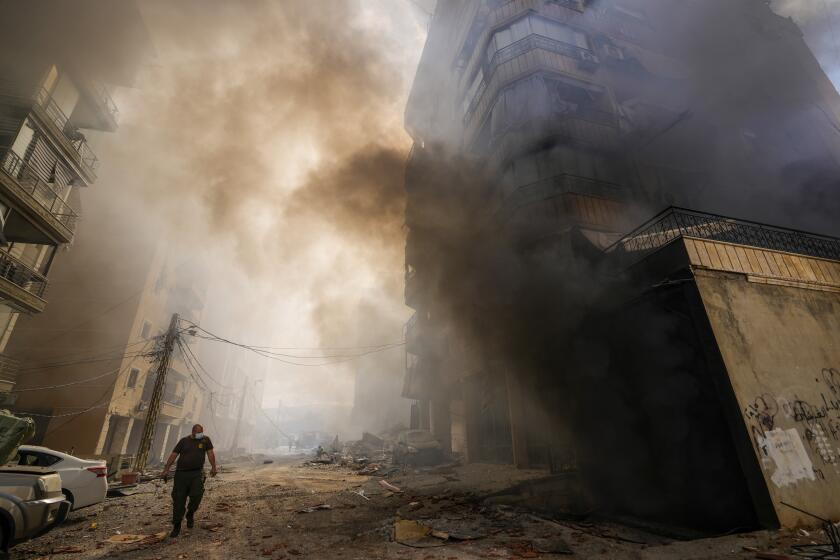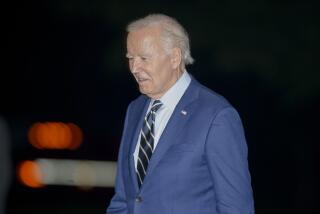Biden says he doesn’t know whether Israel may be holding up peace deal to influence U.S. election

WASHINGTON — President Biden had terse words for Prime Minister Benjamin Netanyahu on Friday, and said he didn’t know whether the Israeli leader was holding up a peace deal in order to influence the outcome of the U.S. presidential election.
“No administration has helped Israel more than I have. None. None, none,” Biden said, adding, referring to Netanyahu by his nickname: “And I think Bibi should remember that. And whether he’s trying to influence the election, I don’t know, but I’m not counting on that.”
Biden, in a rare appearance in the White House press briefing room, was responding to comments made by one of his allies, Sen. Christopher S. Murphy (D-Conn.), who said on CNN this week that he was concerned Netanyahu had little interest in a peace deal in part because of U.S. politics.
Biden and Netanyahu have long managed a complicated relationship, but they’re running out of space to maneuver as their views diverge on Israel’s war with the Hamas militant group in Gaza and their political futures hang in the balance.
For Biden, a diplomatic deal would help resolve a deep divide among Democrats over the war and shore up support for Vice President Kamala Harris in next month’s election.
Biden has long pushed for a cease-fire, and he and his aides have indicated several times over the last few months that such an agreement was close. But in some cases, Netanyahu has publicly resisted the prospect while U.S. and Israeli officials continued to talk in private about eking out a deal.
U.S. ability to rein in Israel seems to wane as conflict spreads through Lebanon to Iran’s doorstep.
Just last week, the U.S., France and other allies jointly called for a 21-day Israel-Hezbollah cease-fire, and expected Israel to welcome the plan. Instead, Netanyahu told leaders gathered for the U.N. General Assembly that Israel would “continue degrading Hezbollah until all our objectives are met.”
Israel has pressed forward on two fronts, killing top Hezbollah leaders and pursuing a ground incursion into Lebanon against the Iran-backed political and militant group as well as conducting airstrikes in the Gaza Strip. And it has vowed to retaliate for Iran’s ballistic missile attack this week, as the region braced for further escalation.
Iran and Israel trade threats of destruction, and Hezbollah and Israel report ‘close-quarter’ combat in Lebanon.
Oil prices rose 5% Thursday as concerns mounted that Israel would hit Iranian oil facilities as payback; a surge in gas prices so close to the election may be a blow to Harris, even after strong economic news Friday.
Biden said there had been no decision yet on what type of response there would be toward Iran, though there has been talk about Israel striking Iran’s oil fields — and “I think if I were in their shoes, I’d be thinking about other alternatives than striking oil fields.”
Biden rejected the idea that he was seeking a meeting with Netanyahu to discuss the response to Iran. “I’m assuming when they make a decision on how they’re going to respond, we will then have a discussion,” he said.
But Netanyahu has grown increasingly resistant to Biden’s public urging and private pleading. And Biden in the past has held up delivery of heavy bombs to Israel and increasingly voiced concerns over an all-out war in the Middle East. Despite their long acquaintanceship, the two are not close or particularly friendly.
Biden has remained consistent in his support for Israel’s defense and security and in the aftermath of the deadly Oct. 7 Hamas attacks in Israel. Since then, with few exceptions, Biden has supported ongoing and enhanced U.S. arms transfers to Israel while cautioning the Israelis to be careful in their responses to avoid civilian casualties.
More than 41,000 Palestinians have been killed in the Gaza war, according to the Gaza Health Ministry. Its figures do not distinguish between combatants and civilians, but they indicate that more than half of the dead are women and children.
Biden has also ordered the U.S. military to step up its profile in the region to protect Israel from attacks by Hamas, Hezbollah, the Iranian-backed Houthi rebels in Yemen and Iran itself. In April, and again earlier this week, the U.S. was a leading player in shooting down missiles fired by Iran into Israel.
Republican Donald Trump and Netanyahu have a cordial relationship, and the former president hosted the prime minister in July. While president, Trump made several controversial moves in support of Israel that delighted Netanyahu.
Long writes for the Associated Press. Times staff contributed to this report.
More to Read
Sign up for Essential California
The most important California stories and recommendations in your inbox every morning.
You may occasionally receive promotional content from the Los Angeles Times.












